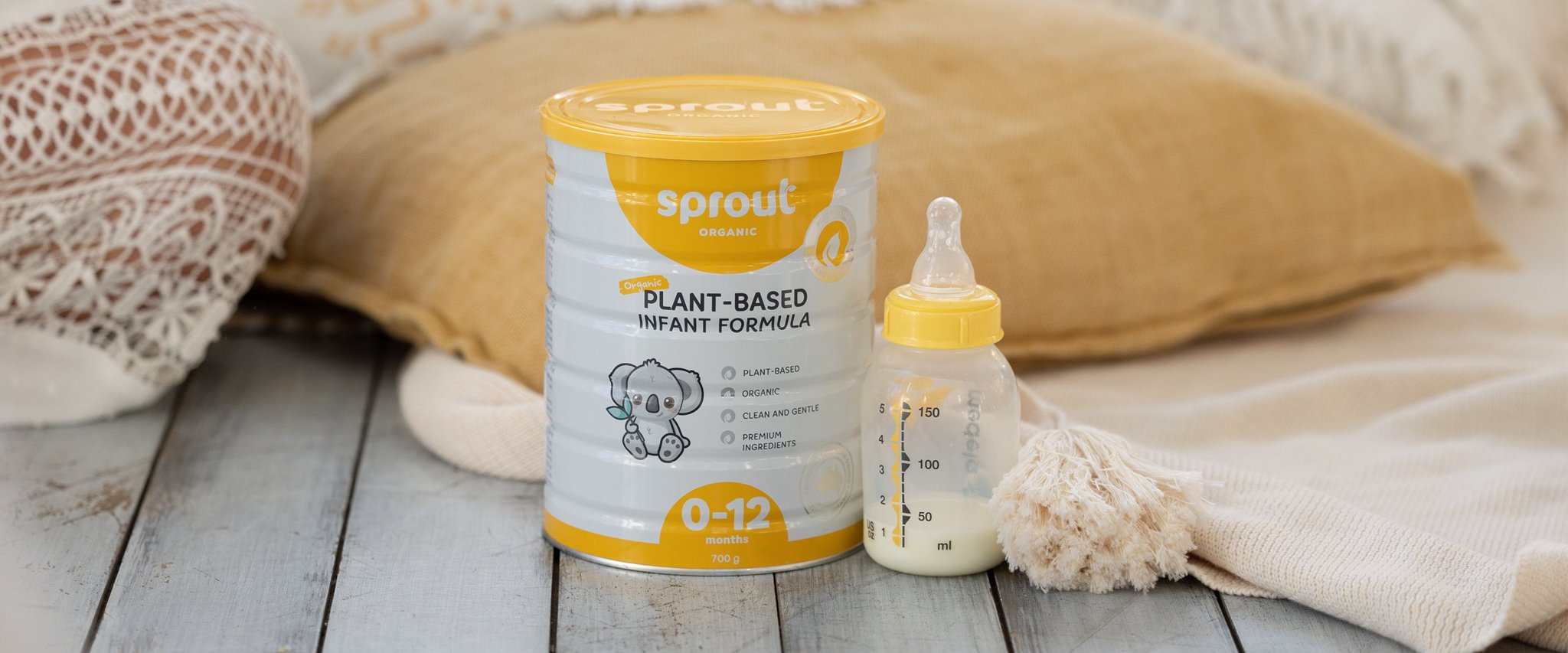Plant-Based Pregnancy: Your Guide to Thriving on Plants
Pregnancy is an exciting time, and while it can come with its ups and downs like nausea, cravings, and the anticipation of birth and parenthood, it's also an opportunity to embrace positive changes. If you’re hoping to have a predominantly plant-based or vegan pregnancy, you may feel a little uncertain at first. The good news is that eating a well-balanced plant-based diet is a wonderful choice, and it can be incredibly nourishing during this special time. This guide will support you with some considerations when planning a healthy plant-based pregnancy.

A well-planned plant-based diet offers numerous health benefits, and this is no different during pregnancy. Many health bodies worldwide, including the Australian Medical and Research Council (NHMRC) and the American Academy of Dietetics, suggest that well-planned vegetarian and vegan diets are safe across all life stages, including pregnancy and breastfeeding. While a diverse plant-based diet provides a wealth of nutrients, some require special attention, particularly during pregnancy with increasing nutrient needs. Below is an outline of essential nutritional considerations when planning for a plant-based pregnancy.
KEY NUTRIENTS TO CONSIDER:
Energy
Growing a tiny human demands additional energy and nutrients. While overall energy requirements remain the same for the initial trimester, the second and final trimester require additional kilojoules. It’s essential to focus on including more nutrient-dense foods, such as legumes, nut butters, and whole grains, during this time.
- First Trimester: No additional kilojoules needed
- Second Trimester: +1,400 kJ per day extra
- Third Trimester: +1,800 kJ per day extra
How to meet your growing needs:
Include an additional snack such as; muesli bar, protein ball, hummus on toast, smoothie, crackers with peanut butter, a fruit and nut mix, or soy yoghurt.
Increase your portion: Slightly increase your serving size of protein and/or carbohydrates at meals. As your belly grows, more frequent, nutrient-dense meals may be more practical.

Protein
Throughout pregnancy, you need around an extra 25% more protein each day compared to pre-pregnancy, totalling about 60g of protein daily. Prioritising plant-based proteins at each meal can ensure you are getting enough. Plant-rich protein foods include quinoa, lentils, chickpeas, kidney beans, edamame, tofu, tempeh, raw nuts and seeds, their butters, soy milk, textured vegetable protein (TVP), and tahini.
Iron
Iron requirements increase by around 50% (from 18mg to 27mg) during pregnancy, to account for the expanding blood volume needed to grow your bub. Iron deficiency, particularly in the second and third trimesters, is common, and iron supplementation is often necessary. Since plant-based iron (non-heme iron) can be trickier for the body to absorb, it is essential for plant-based mammas to prioritise dietary iron. Your doctor can check your blood levels at regular intervals throughout your pregnancy to determine your levels.
Improve absorption: Pair iron-rich foods with vitamin C-rich foods (e.g., strawberries, kiwi fruit, tomatoes, capsicum, citrus) at meals. Avoid calcium-fortified products and supplements around iron-rich meals as calcium hinders iron absorption. Soaking, sprouting, and fermenting whole grains, legumes, and nuts can optimise iron absorption by reducing the phytate content. Avoid tannins in tea and coffee during meals.
Iron-rich foods: Tofu, sunflower seeds, peanut butter, cashews, almonds, green leafy vegetables (bok choy, kale, broccoli), dried figs, blackstrap molasses.

Iodine
Iodine is essential for developing the foetal brain, with pregnant women requiring 220 mcg of iodine daily. Iodine is found in dairy products, fish, iodized salt, and seaweed (consumed in moderation due to its high levels). For plant-based mothers, cooking with iodized salt (¼ tsp daily) and ensuring a prenatal vitamin with adequate iodine is recommended.
Calcium
Although calcium needs don’t increase during pregnancy (1,000mg per day), ensuring adequate calcium intake is important, especially for plant-based eaters. Since calcium can inhibit iron absorption, focus on calcium-rich snacks throughout the day, such as fortified soy-based smoothies, yoghurts and cheeses, edamame beans, almonds, tofu (calcium-set), leafy greens, and broccoli.
Vitamin D
Vitamin D needs remain the same as pre-pregnancy, 600 IU per day. The best sources are adequate sun exposure (15-20 minutes of direct sunlight daily) and supplementation if necessary. Your doctor can check your blood levels and advise on dosage. Check your prenatal vitamin for vitamin D content.
Vitamin B12
Vitamin B12 is vital for maternal and foetal health, particularly for the nervous system and red blood cell production. Inadequate B12 intake can cause irreversible damage. Since B12 is found in animal products, those following a plant-based diet need supplementation. Requirements during pregnancy are slightly higher (2.6mcg per day). Check your levels before, during, and after pregnancy. Although most prenatal supplements contain some B12, a standalone B12 supplement is generally recommended for those following a plant-based diet.

Folate
Folate is essential for the developing embryo. Folate-rich foods include leafy greens and legumes, which are common in plant-rich diets. In Australia, mandatory fortification of flour helps meet requirements. Medical bodies recommend all pregnant women take 600 mcg of folic acid daily, starting at least one month before (for planned pregnancies) and three months after becoming pregnant.
Choline
Choline is essential for placenta, foetal brain, and nervous system development. During pregnancy, requirements are 450 mg per day. As eggs are the richest source of choline, those who don't consume them regularly should ensure their prenatal provides adequate choline. Include plant-based sources of choline daily, such as tofu, tempeh, soy milk, quinoa, broccoli, flaxseeds, and chia seeds.
Omega-3s
Omega-3 fatty acids support foetal brain and eye development. The three key types are ALA, EPA, and DHA. ALA is found in plant-based foods, and pregnant women can meet their needs with 2 tablespoons of flaxseeds or chia seeds, 3 tablespoons of hemp seeds, or about 1/4 cup of walnuts daily. Since the conversion of ALA to EPA and DHA may be insufficient, an algae-based DHA supplement with at least 200 mg per day is recommended if you’re not consuming low-mercury fish twice a week.
Zinc
Zinc requirements increase from 8mg to 11 mg per day during pregnancy, especially in the first trimester. Plant-based mammas should aim for 15mg of zinc daily to counteract phytates that hinder zinc absorption. Most prenatal vitamins provide this amount. Zinc-rich foods include chickpeas, lentils, hemp seeds, pumpkin seeds, tahini, quinoa, brown rice, and oats.
WHAT SUPPLEMENTS SHOULD I CONSIDER?
A prenatal supplement is generally recommended due to the unique nutritional needs during pregnancy. A multivitamin can help fill any gaps. For plant-based eaters, select a prenatal supplement with:
- Folic Acid: 400mcg
- Iodine: 150-220mcg
- Selenium: 30mcg
- Vitamin D: 600IU
- Zinc: >5mg
- Choline: 450mg (if not consuming eggs regularly, this can also be a standalone supplement))
- DHA: 200mg (if not consuming 2 servings of low-mercury fish weekly; this can also be a standalone supplement)
Depending on your diet, blood levels, and nutritional needs, you may need additional supplements, such as iron, extra vitamin D, and a separate vitamin B12 supplement for all vegan mothers. To ensure personalised advice, consult your doctor or a specialised plant-based dietitian regarding specific supplements and doses.

PLANT-BASED PREGNANCY MEAL PLAN SAMPLE (THIRD TRIMESTER):
Breakfast: Oatmeal made with calcium-fortified plant-based milk, and topped with kiwi, banana, walnuts and raisins
Morning Tea: Smoothie made with plant-based milk milk, frozen berries, fresh baby spinach, almond/peanut butter and ground flax seeds or hemp hearts
Lunch: Wholegrain sandwich with falafel, plant-based cheese, lettuce, tomato, avocado + soy yoghurt
Afternoon Tea: Handful of mixed raw nuts + piece of fruit
Dinner: Grilled tofu and vegetable stir-fry served over brown rice
Supper: Hot chocolate made with calcium-fortified soy milk
For personalised nutrition and supplementation support, you can find me here or contact me via email at plantbasedfamilynutrition@gmail.com
About the Author: Monica Rundle, is an Accredited Practising Dietitian, and founder of Plant Based Family Nutrition, an online nutrition clinic dedicated to helping families make small, sustainable dietary changes that can make a big difference to their overall health and that of the environment.






Leave a comment